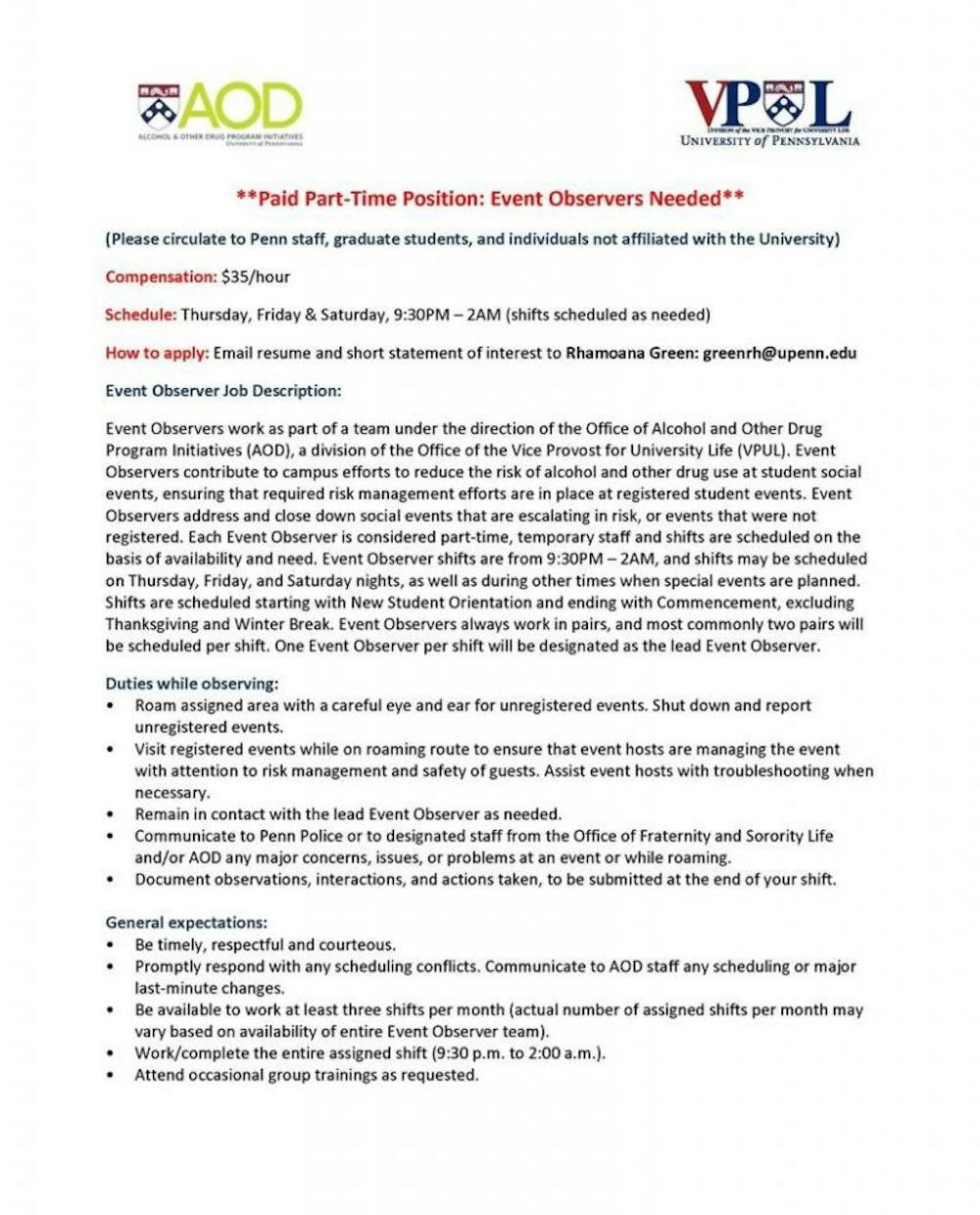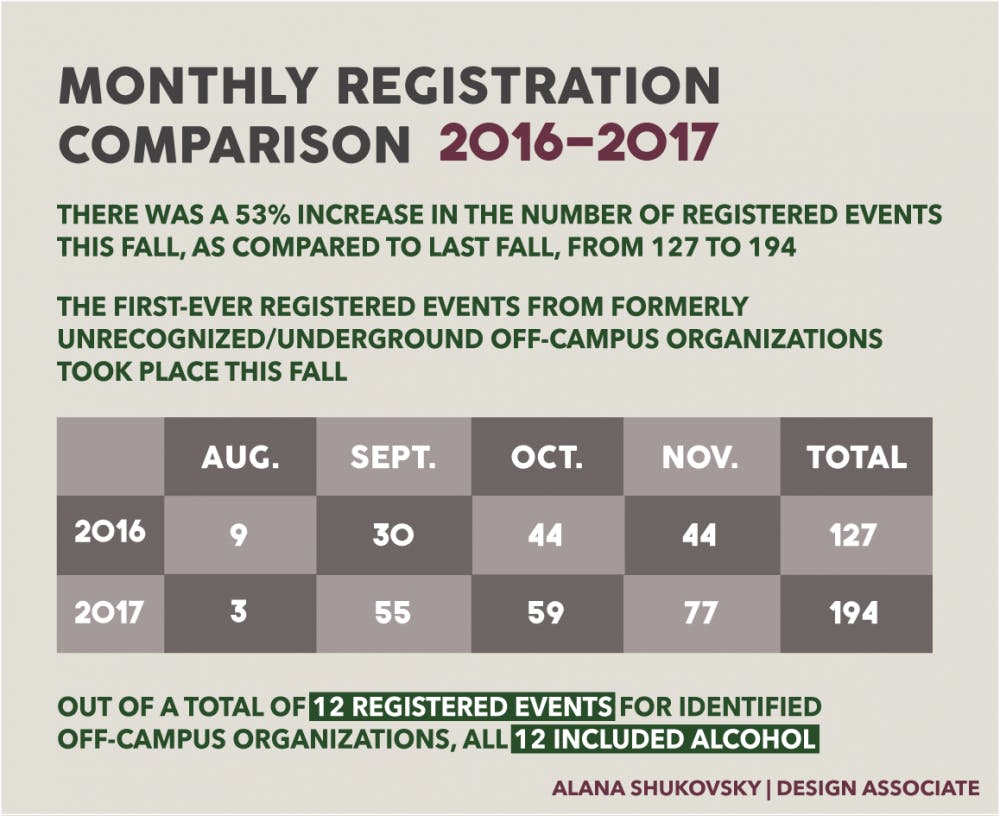
Penn formally adopted a controversial set of new alcohol and drug policies, enacting sweeping changes to Penn social life.
The new guidelines, the first version of which was introduced just days before the beginning of the 2017-2018 academic year, were only officially adopted this month, according to a short blurb from Provost Wendell Pritchett in the Penn Almanac on March 20.
The changes were informed by a study published by the Task Force on a Safe and Responsible Campus Community, which was created in 2017 largely in response to an incident in September 2016 when off-campus organization OZ sent an email to freshman women that ended up on flyers posted around campus that said, "This is what rape culture looks like."
Some of these new guidelines that have now been codified in Pennbook include a limit of four drinks per person at any social event, the prohibition of kegs at student-run events, and an outright ban on drinking games and competitions.
After the announcement of the new policies in September, students reported a spike in shutdowns of a range of events — from parties, to alcohol-free study sessions, to a charity event — by "event observers."
Working in tandem with Penn Police, these "event observers" are paid $35 an hour to patrol the University City area to report parties that are in violation of the University's policies.

While many students assume the emergence of the "event observers" was directly caused by the proposal of the new guidelines, Rob Nelson, the executive director for Education and Academic Planning for the Vice Provost for University Life, contended that the two were independent of each other.
"The practices [of implementing event observers] that we have been undertaking in regards to off-campus activities and to address off-campus behaviors were included under the old policies,” Nelson said. “The new policies clarify some of those things.”
In September, in light of Penn's crackdown on student social events, over 2,500 Penn students signed an online petition titled “The Ability to Have a Social Life at Penn," in which the author, College senior Cami Potter, blamed the University for worsening students' mental health by increasing the regulation of social events.

Potter was not aware that these policies had officially been adopted, but said she was disappointed that the administration chose to disregard student opinion on the matter.
“I hope that there is a common ground eventually found, but it doesn’t really seem like they really wanted to find a common ground after writing these rules into the rulebook and not communicating that they were written in," Potter said when hearing about the official rule changes.
Despite student backlash, data from the University suggested that groups largely complied with the event regulations throughout the fall semester. Though there were only three registered events in August, the number of registered events increased each month after Penn Police continued to shut down unregistered gatherings.

While Nelson confirmed that "event observers" will continue "to patrol the area, to enforce the procedures in place, [and] to keep students safe," the new policies also call for the presence of "host monitors."
The guidelines dictate that all parties must have at lease one sober "host monitor" for every 30 guests at an on-campus venue or off-campus residence, or one for every 50 guests at an off-campus third-party venue. They will be present to respond to emergency situations and to "take any necessary steps to protect the health and safety of guests."
Students must register all parties involving alcohol with The Office of Alcohol & Other Drug Program Initiatives at least seven days before the event.
For such events, hosts must fill out an extensive form detailing the host organization, the expected number of attendees, the "purpose/theme of event," the name and contact information for sober hosts, the type of alcohol being served, and initial indication that they will reach out to arrange bartenders and security guards for the event.
The new guidelines codify a ban on the consumption of alcohol in "outdoor public areas" such as walkways, building steps, porches, and other green spaces unless given approval by administrators and the Division of Public Safety.
The regulations also implement a mandate requiring all events to have front-of-house security guards and that alcohol may be served only from a "controlled, designated area" by University-approved bartenders. Depending on the size of a gathering, the costs of these services can be upwards of $90 an hour.
Students have raised concerns that the rules add crippling costs to groups who already struggle with low budgets and encourage them to host events further away from the safety of the Penn Police patrol zone.
Nelson emphasized that the University is working to subsidize such costs. While he highlighted the fact that campus administrators are "constantly having discussions with student organizations to address” students moving social events further away from campus, he was not yet able to offer concrete solutions that Penn plans to implement to address the issue.
The new rules were reviewed by the Academic Planning and Budget Committee, Council of Graduate Deans, Council of Professional Masters Deans, Council of Undergraduate Deans, Graduate and Professional Student Assembly, and the Undergraduate Assembly.
The Daily Pennsylvanian is an independent, student-run newspaper. Please consider making a donation to support the coverage that shapes the University. Your generosity ensures a future of strong journalism at Penn.
Donate



